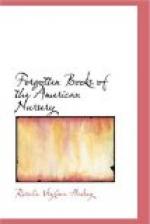The first glimpse of the amusement book proper appears in that unique “History of Printing in America,” by Isaiah Thomas. This describes, among other old printers, one Thomas Fleet, who established himself in Boston about 1713. “At first,” wrote Mr. Thomas, “he printed pamphlets for booksellers, small books for children and ballads” in Pudding Lane.[19-A] “He owned several negroes, one of which ... was an ingenious man and cut on wooden blocks all the pictures which decorated the ballads and small books for his master."[19-B] As corroborative of these statements Thomas also mentions Thomas Fleet, Sr., as “the putative compiler of Mother Goose Melodies, which he first published in 1719, bearing the title of ‘Songs for the Nursery.’”
Much discussion has arisen as to the earliest edition of Mother Goose. Thomas’s suggestion as to the origin of the first American edition has been of late years relegated to the region of myth. Nevertheless, there is something to be said in favor of the existence of some book of nonsense at that time. The Boston “News Letter” for April 12-19, 1739, contained a criticism of Tate and Brady’s version of the Psalms, in which the reviewer wrote that in Psalm VI the translators used the phrase, “a wretch forlorn.” He added: “(1) There is nothing of this in the original or the English Psalter. (2) ’Tis a low expression and to add a low one is the less allowable. But (3) what I am most concerned for is, that it will be apt to make our Children think of the line in their vulgar Play song; much like it, ‘This is the maiden all forlorn.’” We recognize at once a reference to our nursery friend of the “House that Jack Built;” and if this and “Tom Thumb” were sold in Boston, why should not other ditties have been among the chap-books which Thomas remembered to have set up when a ’prentice lad in the printing-house of Zechariah Fowle, who in turn had copied some issued previously by Thomas Fleet? In further confirmation of Thomas’s statement is a paragraph in the preface to an edition of Mother Goose, published in Boston in 1833, by Monroe & Francis. The editor traces the origin of these rhymes to a London book entitled, “Rhymes for the Nursery or Lullabies for Children,” “that,” he writes, “contained many of the identical pieces handed down to us.” He continues: “The first book of the kind known to be printed in this




